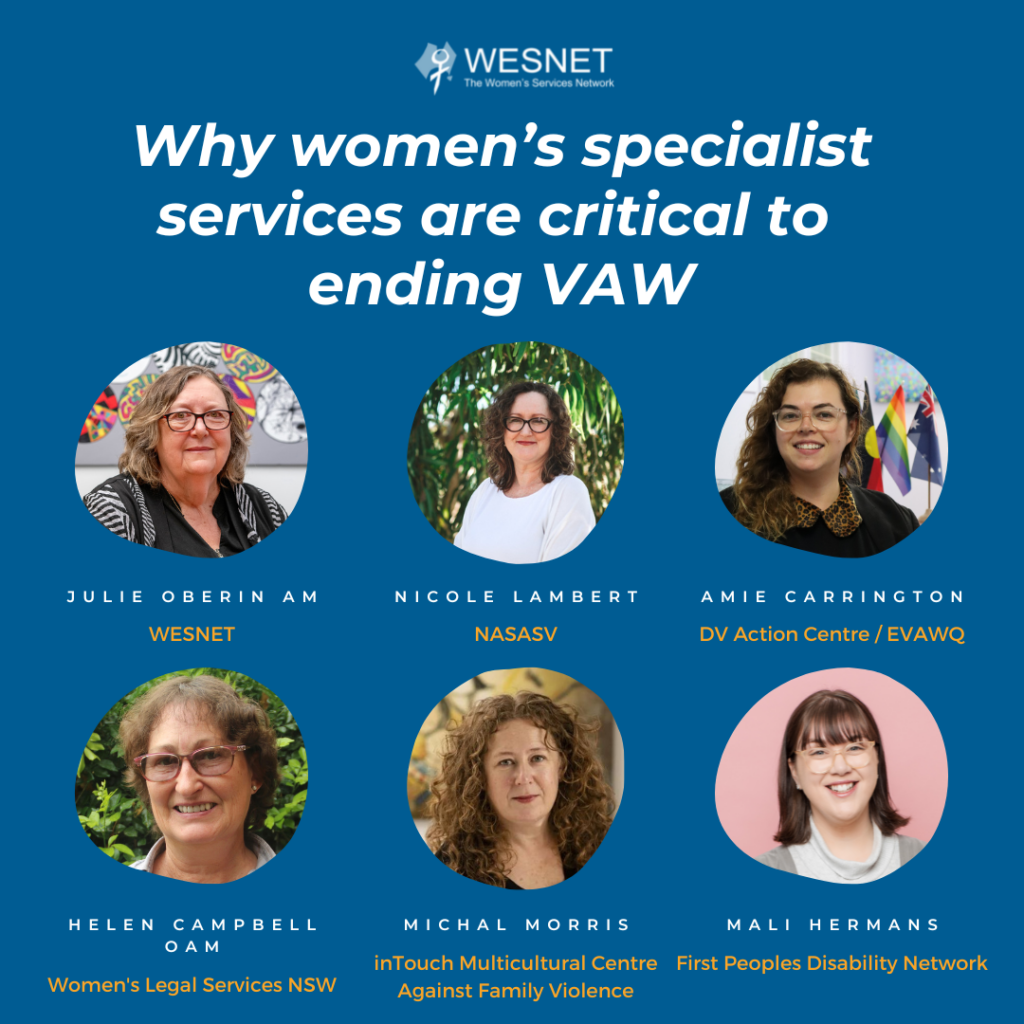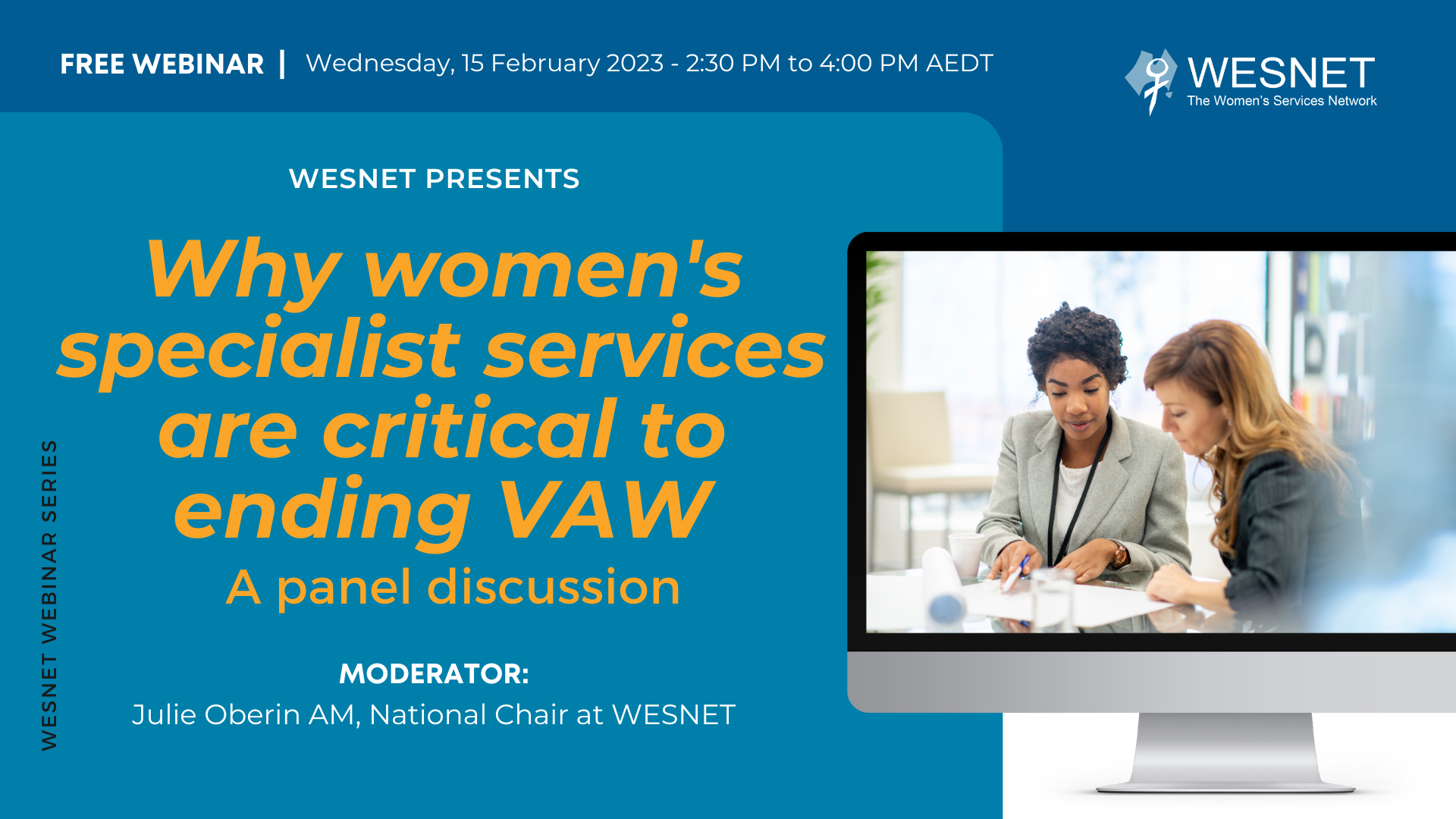WESNET WEBINAR SERIES 2023
On 15 February 2023, WESNET hosted a webinar exploring the role of women’s specialist services and why they are so important.
The session was facilitated by Julie Oberin AM, WESNET National Chair, who was joined by panellists:

- Amie Carrington,CEO, Domestic Violence Action Centre, Queensland
- Helen Campbell OAM, Executive Officer, Women’s Legal Services NSW
- Michal Morris, CEO, inTouch Multicultural Centre Against Family Violence
- Nicole Lambert, Vice Chairperson, National Association of Services Against Sexual Violence
- Mali Hermans, Senior Policy Officer, First Peoples Disability Network
(Scroll down to watch the webinar recording).
Who are women’s specialist services?
First up, Karen Bentley, WESNET CEO, presented an overview of the sector, including its roots in feminist activism, its international underpinnings, and the current domestic framework as represented in the new National Plan to End Violence Against Women and Children. Karen described the sector – including the various types of women’s specialist services – and focused on the things that make women’s specialist services unique. The AWAVA Good Practice Principles were highlighted as a good descriptive source, noting the centrality of trauma-informed and women-centred practice.
Intersectionality
Mali Hermans talked about intersectionality and how a really important precondition for embedding intersectionality across service provision is making sure that there are workers within the services who come from the communities themselves. In the context of women with disabilities, Mali highlighted a Brisbane-based service WWILD – a self-determined service in which women with intellectual disabilities hold decision-making power as well as act as peer support workers for each other – as one of many women’s specialist services who have historically led the way in adopting intersectional practices and embedding comprehensive analyses of power and oppression.
Understanding safety
Michal Morris highlighted how women’s specialist services have a very complex understanding of safety. In the case of her work – working with migrant and refugee women – this means knowing how culture plays a role in family violence, and how it contributes to structural and systemic injustices that need to be taken into account when assessing the safety and risk of the individual and their families.
Generalist versus specialist services
Panellists expressed a range of views about the consequences of moving specialist functions into generalist services. Helen Campbell OAM, for example, noted that defunding specialist services mean fewer services for women, not just in terms of women’s choice but also in overall coverage and availability. Drawing on the experience of budget decisions under the former federal government of moving funding from women’s services to community legal centres and legal aid, she described how this deprived women of access to the services they needed.
Other key points raised included the inability of generalist services to leverage knowledge, networks and expertise to wrap a range of services around women; that specialist services are one of the only ways that marginalised women in particular know that they will get access to trauma-informed care; and that reducing access to specialist services will reduce safety and reduce outcomes for victim-survivors.
Critical pressures on services
Amie Carrington described the current critical pressures on services as centring on unmet demand, workforce sustainability for the specialist workforce, and the rising impact of global warming and weather events. Amie talked particularly about the impacts of the economic outlook and the housing crisis, and about how these create a crisis point in supporting victim-survivors to have their needs met when fleeing. A need to invest in growing the workforce was highlighted, along with the direct impacts of climate change.
Consequences of service shortfalls
Amie noted that her service was currently turning away around 30% of people who could be eligible for safety upgrades and that even with motel accommodation hard to find at this time, many women were remaining in unsafe circumstances. In the context of legal services, Helen highlighted that 40% of the women who seek assistance from women’s legal services are turned away and that these women are likely to remain in a dangerous situation and continue to experience abuse and trauma.
Need for a national approach
Nicole Lambert spoke about the importance of a national approach in ensuring equity in accessing services so that each person can get the same level of response wherever they are. She noted that current differences between state and territory service and funding models, and legislation and policy, inhibit services’ ability to achieve a good service standard for all clients.
Key messages to governments
Panellists were invited to highlight one key message to governments and the community about women’s specialist services.
- Specialist services – when they’re appropriately used within an integrated service system – are able to channel limited resources within the bigger system to get better results for safety, to get better quality of care and support for victim-survivors, and also improve perpetrator accountability. Investment is needed now to better manage the increased demand that we’re going to see over the upcoming years.
- Women’s specialist services are a lifeline for so many victim-survivors, particularly those who come from marginalised backgrounds. Without access to these services, it’s very unlikely that oppressed people will see justice or have the support needed to begin a recovery journey or start having access to healing.
- The new National Plan to End Violence Against Women and Children provides an excellent opportunity for governments to work with the specialist sector in partnership about what its implementation looks like. There is an enormous depth of experience and understanding within the sector, and knowledge about what is needed to actually end violence.
- There is a need to keep applying a firm gender lens. It is a giant step forward that it has been finally acknowledged that violence is gendered and that violence against women stems from gender inequality, but it is still absolutely essential that services be delivered within a feminist framework so that women and victim-survivors remain central.
- Specialist service provision requires a specialist workforce with a distinct set of skills, knowledge and expertise which is already there in existing specialist services but not in generalist services. The most cost-effective way for governments to build workforce capacity is to grow investment in specialist services.
WESNET – as the national peak body for women’s specialist domestic and family violence services – looks forward to continuing to work with its members and allied organisations to deliver these messages to the government and to ultimately help our services enable women and children to live free from violence.

![“[Having] someone who has gone through that experience or is connected to your community is integral to providing trauma-informed care for people.”](https://wesnet.org.au/wp-content/uploads/sites/3/2023/02/1-1024x256.png)


